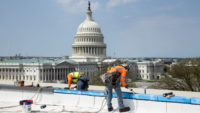Neither staff nor members of the American Society of Civil Engineers are guilty of ethics violations in the society’s assessment of New Orleans’ flood defense performance during Hurricane Katrina, nor in its peer review of the U.S. Army Corps of Engineers-funded task force that studied it, ASCE’s standing committee on Professional Conduct has concluded after a 13-month investigation.
“No charges of ethical misconduct against any of the individuals named were filed by CPC as a result of the inquiry,” says CPC Chair Rich Hovey.
A charge of lax ethics was leveled by Raymond Seed, a University of California-Berkeley civil engineering professor, in a 42-page complaint filed in October 2007. Seed said ASCE’s reviewers improperly accepted positions in the Corps-sponsored post-Katrina Interagency Performance Evaluation Task Force investigation, which absolved the Corps of mistakes, and that reviewers also failed to flag mistakes Seed said were made in rebuilding levees and floodwalls. Later, Seed, along with Levees.org, a New Orleans-area nonprofit, also accused ASCE of flawed ethics for accepting $1.1 million from the Corps to fund the peer review.
ASCE responded by convening two reviews: an external commission led by former U.S. Rep. Sherwood Boehlert (R-N.Y.) to examine how ASCE review funding is handled, and an internal investigation of potential ethical misconduct. The first study recommended procedural changes in peer reviews to guard against conflicts of interest. Now, the second report has found no ethical misconduct.
D. Wayne Klotz, ASCE president, says the report should reaffirm confidence in ASCE’s findings and recommendations related to New Orleans’ hurricane protection system. Klotz adds that ASCE’s mission requires the exchange of ideas. Despite the “sometimes painful” debate surrounding the allegations, he says he believes the profession “is stronger” as a result.
Seed did not respond to telephone and e-mail requests for a comment on the committee’s report.




